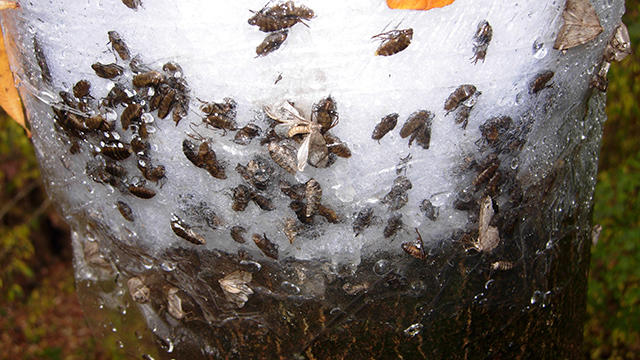Here’s How Oakville is Getting Rid of Horrifying Insects
Published April 5, 2018 at 4:47 pm

We all know bugs are a menace (and at the very least, the environmentally-important ones should do their best to neither be seen nor heard), and the Town of Oakville is battling certain beasties fr
We all know bugs are a menace (and at the very least, the environmentally-important ones should do their best to neither be seen nor heard), and the Town of Oakville is battling certain beasties from destroying beautiful trees.
“The town’s tree canopy is one of our greatest assets,” said Mayor Rob Burton.
“If left untreated, gypsy moth and cankerworm have the potential of damaging 409,000 trees across our communities. That’s 23 per cent of the town’s tree canopy.”
With an increase in gypsy moth and cankerworm populations on the horizon, a public information session is being held on Tuesday.
Residents can learn about the town’s aerial spray program in town woodlands and how to take action to help stop gypsy moth and cankerworm from harming their trees and from spreading to other areas.
Gypsy moth and cankerworm populations are expected to reach extreme levels in Oakville this year.
Based on surveys conducted in 2017, 26 town woodlands were identified as high-risk areas that will likely experience serious tree defoliation and the potential loss of thousands of trees if no action is taken.
As a result, the town will be conducting an aerial spray of a biological insecticide to curb the populations in heavily infested woodlands, likely in May when the young caterpillars start emerging.
The treatment is a naturally occurring soil bacterium called Bacillus thuringiensis kurstaki (Btk) that is poisonous to certain types of caterpillars when ingested but is not harmful to humans or other insects or animals.
The gypsy moth is a non-native insect that is considered a major pest in North America.
The larvae, or caterpillar stage, of this insect can potentially devour every leaf of a tree’s canopy.
Cankerworm (also known as inch worm) is a native insect whose population increases every 10-15 years.
They also feed on tree leaves and have a serious impact on tree health. After severe or repeated loss of leaves, trees can die or become so weakened that they are vulnerable to other pressures.
Town staff are currently working with other municipalities to coordinate a cooperative population control program.
The information session will be held on April 10 from 6 p.m. until 7:30 p.m. at Queen Elizabeth Park Community and Cultural Centre, 2302 Bridge Rd.
Learn more about gypsy moths and cankerworms and the town’s control program.
insauga's Editorial Standards and Policies advertising





